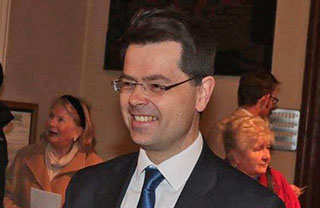Brokenshire: Five questions Corbyn MUST answer on the IRA
Northern Ireland Secretary James Brokenshire is today demanding Jeremy Corbyn and his top team come clean about their true attitudes towards IRA ‘terrorism’ following an interview on a news channel with Jeremy Corbyn on SKY TV.

In recent days Corbyn, his closest ally John McDonnell and Shadow Home Secretary Diane Abbott have all been revealed as having “extremely worrying views” about the campaign of violence carried out by IRA ‘terrorists’ argues Brokenshire.
On Sunday, Jeremy Corbyn, who could be Prime Minister in 18 days, failed to condemn IRA bombing FIVE times on a SKY TV interview. This follows a long political career of sympathy for the IRA cause argues James Brokenshire.
He says that Diane Abbott, who could be Home Secretary in charge of keeping Britain safe in 18 days, was revealed to have explicitly backed victory for the IRA in a republican journal, saying: “Every defeat of the British state is a victory for all of us.”
And Shadow Chancellor John McDonnell, who once said (alleges Brokenshire) the “ballot, the bomb and the bullet” would unite Ireland at the height of the IRA’s murderous campaign of terror, claimed to have been supporting the peace process. On Friday he said McDonnell said: “No cause is worth an innocent life” yet failing to make clear whether he considers British soldiers and RUC officers as “innocent lives”.
Following days of worrying revelations, Northern Ireland Secretary James Brokenshire is setting out five clear questions for Jeremy Corbyn and all of his top team to answer – including whether they believe the IRA bombing campaign was “justified and legitimate”.
James Brokenshire said: “I have listened with interest and concern to the various attempts by Jeremy Corbyn and John McDonnell to explain their attitudes towards IRA terrorism during the 1980’s and 1990’s.
“Their complete failure unequivocally to condemn terrorism, and to attempt to contextualise it, are deeply worrying coming from two people who in just over two weeks seek to be entrusted with the security of the United Kingdom.
“In view of their statements in recent days I challenge them to answer the following questions:
1. Should the IRA’s acts of murder be condemned unequivocally?
2. Were the IRA ‘terrorists‘?
3. Mr McDonnell said last week that ‘no cause is worth an innocent life’. Do he and Mr Corbyn include within their definition of innocent life members of the Royal Ulster Constabulary and members of the Armed Forces, for example the 18 soldiers murdered at Warrenpoint in 1979?
4. Do Mr Corbyn and Mr McDonnell regard members of the Armed Forces and the IRA as ‘equivalent’ participants during the troubles?
5. If they are unable unequivocally to condemn IRA terrorism, do they actually believe that the IRA campaign, or as they would put it ‘armed struggle’, was both justified and legitimate?
“These questions can easily be answered with a straight yes or no. Failure to do so will lead people to draw their own conclusions.”
But despite Brokenshire’s demand that Corbyn answers these five questions in a yes or no answer, the language of the questions may, some may argue, appear to be loaded with value judgements. Sinn Féin would contend that the IRA would see their volunteers during the Troubles as ‘freedom fighters‘. It remains unclear yet whether in fact Sinn Féin will rise and support Corbyn, but that may well be the strategy that the Conservatives are working to, to polarise the Labour vote in certain constituencies in England, to give them a greater edge in the election.
A Peace Process has been ongoing since the signing of the GFA in 1997 and an associated decommissioning process and the IRA standing down was also complied with, and it begs the question why Brokenshire, as a Secretary of State, is fighting Theresa May’s corner attacking Corbyn when he should really be remaining neutral as a government representative. This could damage the good work in the peace process achieve over these past twenty years and more, and damage the reputation of the office of Secretary of State for Northern Ireland.
A day is said to be a long time in politics, twenty years is an eternity.

























